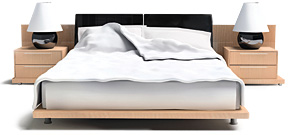For sleep being such an important activity, it gets relatively little focus or attention. Think about your own life for a second. Are there any events or circumstances that could be affecting your ability to have a sound night's rest? What could these events be? Have you thought about the quality of your sleep? Are you getting enough? Are you comfortable when you sleep? These are just some of the questions that need to be addressed.
Aside from some of the more serious things that could be negatively affecting your sleep, there are some variables or situations that you can have more control over. Let's talk about how to change your sleeping conditions so you sleep easier and get the rest your body needs.
The Right Sleep Position Our bodies can assume some strange positions when we fall asleep. Many incidents of pain and discomfort during sleep can be traced back to your position during the night. It is very interesting to note that the positions you sleep in now are the same ones you liked as a baby. It is how you are most comfortable - for better or worse.
The position that is the least stressful on your body is on your back with a pillow under your neck and another under your knees so they are comfortably bent. Bent knees give the lower (lumbar) spine support. The pillow under the neck gives it support as well. However, not many people are able to stay in this position for an entire night. Also, people who snore tend to avoid sleeping on their back because their snoring becomes worse.
 The next best position is on your side. If you are going to sleep like this, a pillow needs to be under your neck and between your knees. The pillow between the knees should keep your legs hip-width apart. This will adequately support your lower spine and pelvis. The problem with this position is the pressure it can put on the point of the shoulder. If you don't use a pillow between the knees, this contributes to lower back pain or other problems.
The next best position is on your side. If you are going to sleep like this, a pillow needs to be under your neck and between your knees. The pillow between the knees should keep your legs hip-width apart. This will adequately support your lower spine and pelvis. The problem with this position is the pressure it can put on the point of the shoulder. If you don't use a pillow between the knees, this contributes to lower back pain or other problems.
The worst option is sleeping on your stomach. Stomach sleeping is not very healthy for your body because you have to turn your head to either side in order to breathe. This puts the neck into extreme rotation, and it can strain the surrounding muscles and place stress on the spine. If you find you cannot keep yourself from rolling onto your stomach when you sleep, then at least put a pillow under your chest to help flex your neck forward a bit for some support.
It is very hard to change how you sleep, but it can be done. It just takes some practice. The key is to find positions that are healthy and stress free for your body. This will allow you to stay asleep longer and deeper, which will maximize the quality of sleep you experience.

